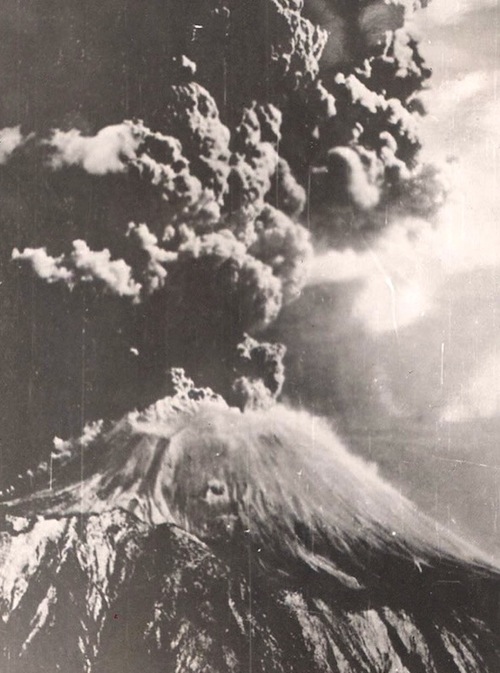Titus, who destroyed Jerusalem in 70 AD, became Emperor on June 24, 79 AD—just two months before the eruption of Mt. Vesuvius. The ashes, pumice and lava from the eruption buried and preserved in tact the Roman towns of Pompeii and Herculaneum.
50 minute BBC video—The Last Day Of Pompeii
In spite of Roman attempts to resuscitate the towns, over the centuries earth, grass, trees, vines and vegetation gradually reclaimed them. Even people living near the site of Pompeii forgot its name. They called it simply “la civita,” the city. It wasn’t until 1763 when an inscription was found that Pompeii regained its name and identity.
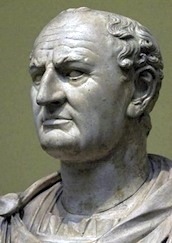
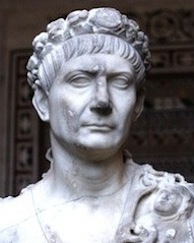
There are two ancient accounts of the eruption. One is by Cassius Dio in Roman History 66.21-23. The other is a letter written by Pliny the Younger, the Elder’s 18 year-old nephew, explaining to the Roman senator and historian Tacitus how his uncle Pliny the Elder, a good friend of Tacitus, died in the eruption. But for almost 1,600 years most who read Pliny’s account of the destruction of Pompeii labeled it a fantasy:
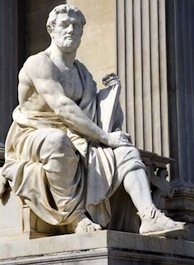
“My dear Tacitus….You ask me to write you something about the death of my uncle so that the account you transmit to posterity is as reliable as possible. I am grateful to you, for I see that his death will be remembered forever if you treat it in your Histories. He perished in a devastation of the loveliest of lands, in a memorable disaster shared by peoples and cities, but this will be a kind of eternal life for him. Although he wrote a great number of enduring works himself, the imperishable nature of your writings will add a great deal to his survival. Happy are they, in my opinion, to whom it is given either to do something worth writing about, or to write something worth reading; most happy, of course, those who do both. With his own books and yours, my uncle will be counted among the latter. It is therefore with great pleasure that I take up, or rather take upon myself the task you have set me.
He was at Misenum (the main station for the Roman Mediterranean fleet; across the bay from Pompeii; about 50 miles away from Pompeii on foot) in his capacity as commander of the fleet on the 24th of August when between 2 and 3 in the afternoon my mother drew his attention to a cloud of unusual size and appearance. He had had a sunbath, then a cold bath, and was reclining after dinner with his books. He called for his shoes and climbed up to where he could get the best view of the phenomenon. The cloud was rising from a mountain—at such a distance we couldn’t tell which, but afterwards learned that it was Vesuvius. I can best describe its shape by likening it to a pine tree. It rose into the sky on a very long “trunk” from which spread some “branches.” I imagine it had been raised by a sudden blast, which then weakened, leaving the cloud unsupported so that its own weight caused it to spread sideways. Some of the cloud was white, in other parts there were dark patches of dirt and ash. The sight of it made the scientist in my uncle determined to see it from closer at hand.
He ordered a boat made ready. He offered me the opportunity of going along, but I preferred to study—he himself happened to have set me a writing exercise. As he was leaving the house he was brought a letter from Tascius’ wife Rectina, who was terrified by the looming danger. 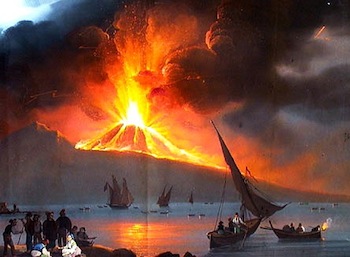 Her villa lay at the foot of Vesuvius, and there was no way out except by boat. She begged him to get her away. He changed his plans. The expedition that started out as a quest for knowledge now called for courage. He launched the quadriremes and embarked himself, a source of aid for more people than just Rectina, for that delightful shore was a populous one. He hurried to a place from which others were fleeing, and held his course directly into danger. Was he afraid? It seems not, as he kept up a continuous observation of the various movements and shapes of that evil cloud, dictating what he saw.
Her villa lay at the foot of Vesuvius, and there was no way out except by boat. She begged him to get her away. He changed his plans. The expedition that started out as a quest for knowledge now called for courage. He launched the quadriremes and embarked himself, a source of aid for more people than just Rectina, for that delightful shore was a populous one. He hurried to a place from which others were fleeing, and held his course directly into danger. Was he afraid? It seems not, as he kept up a continuous observation of the various movements and shapes of that evil cloud, dictating what he saw.
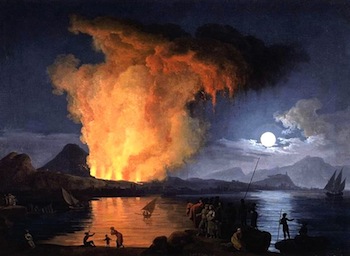 Ash was falling onto the ships now, darker and denser the closer they went. Now it was bits of pumice, and rocks that were blackened and burned and shattered by the fire. Now the sea is shoal; debris from the mountain blocks the shore. He paused for a moment wondering whether to turn back as the helmsman urged him. ‘Fortune helps the brave,’ he said, ‘Head for Pomponianus (a commander of part of the fleet).’ At Stabiae (about 3 miles from Pompeii), on the other side of the bay formed by the gradually curving shore, Pomponianus had loaded up his ships even before the danger arrived, though it was visible and indeed extremely close, once it intensified. He planned to put out as soon as the contrary wind let up. That very wind carried my uncle right in, and he embraced the frightened man and gave him comfort and courage. In order to lessen the other’s fear by showing his own unconcern he asked to be taken to the baths. He bathed and dined, carefree or at least appearing so (which is equally impressive). Meanwhile, broad sheets of flame were lighting up many parts of Vesuvius; their light and brightness were the more vivid for the darkness of the night. To alleviate people’s fears my uncle claimed that the flames came from the deserted homes of farmers who had left in a panic with the hearth fires still alight. Then he rested, and gave every indication of actually sleeping; people who passed by his door heard his snores, which were rather resonant since he was a heavy man. The ground outside his room rose so high with the mixture of ash and stones that if he had spent any more time there escape would have been impossible. He got up and came out, restoring himself to Pomponianus and the others who had been unable to sleep. They discussed what to do, whether to remain under cover or to try the open air.
Ash was falling onto the ships now, darker and denser the closer they went. Now it was bits of pumice, and rocks that were blackened and burned and shattered by the fire. Now the sea is shoal; debris from the mountain blocks the shore. He paused for a moment wondering whether to turn back as the helmsman urged him. ‘Fortune helps the brave,’ he said, ‘Head for Pomponianus (a commander of part of the fleet).’ At Stabiae (about 3 miles from Pompeii), on the other side of the bay formed by the gradually curving shore, Pomponianus had loaded up his ships even before the danger arrived, though it was visible and indeed extremely close, once it intensified. He planned to put out as soon as the contrary wind let up. That very wind carried my uncle right in, and he embraced the frightened man and gave him comfort and courage. In order to lessen the other’s fear by showing his own unconcern he asked to be taken to the baths. He bathed and dined, carefree or at least appearing so (which is equally impressive). Meanwhile, broad sheets of flame were lighting up many parts of Vesuvius; their light and brightness were the more vivid for the darkness of the night. To alleviate people’s fears my uncle claimed that the flames came from the deserted homes of farmers who had left in a panic with the hearth fires still alight. Then he rested, and gave every indication of actually sleeping; people who passed by his door heard his snores, which were rather resonant since he was a heavy man. The ground outside his room rose so high with the mixture of ash and stones that if he had spent any more time there escape would have been impossible. He got up and came out, restoring himself to Pomponianus and the others who had been unable to sleep. They discussed what to do, whether to remain under cover or to try the open air.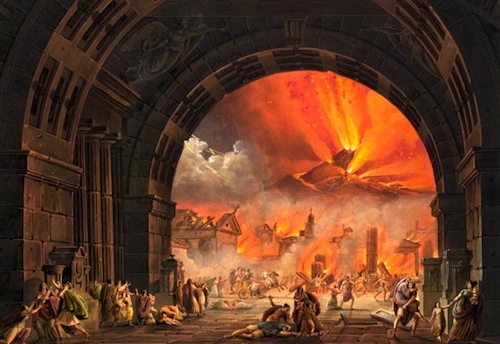
The buildings were being rocked by a series of strong tremors, and appeared to have come loose from their foundations and to be sliding this way and that. Outside, however, there was danger from the rocks that were coming down, light and fire-consumed as these bits of pumice were. Weighing the relative dangers they chose the outdoors; in my uncle’s case it was a rational decision, others just chose the alternative that frightened them the least.
They tied pillows on top of their heads as protection against the shower of rock. It was daylight now elsewhere in the world, but there the darkness was darker and thicker than any night. But they had torches and other lights. They decided to go down to the shore, to see from close up if anything was possible by sea. But it remained as rough and uncooperative as before. Resting in the shade of a sail he drank once or twice from the cold water he had asked for. Then came a smell of sulfur, announcing the flames, and the flames themselves, sending others into flight but reviving him. Supported by two small slaves he stood up, and immediately collapsed. As I understand it, his breathing was obstructed by the dust-laden air, and his innards, which were never strong and often blocked or upset, simply shut down. When daylight came again 2 days after he died, his body was found untouched, unharmed, in the clothing that he had had on. He looked more asleep than dead.
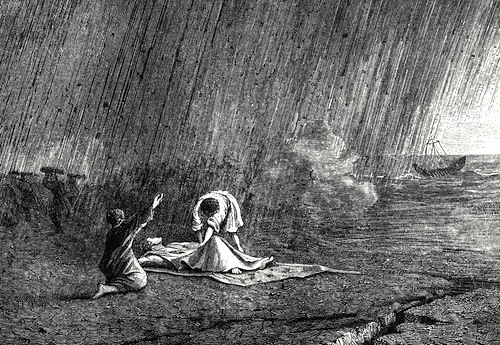
Meanwhile at Misenum, my mother and I—but this has nothing to do with history, and you only asked for information about his death. I’ll stop here then. But I will say one more thing, namely, that I have written out everything that I did at the time and heard while memories were still fresh. You will use the important bits, for it is one thing to write a letter, another to write history (Tacitus wrote the invaluable Annals and Histories), one thing to write to a friend, another to write for the public. Farewell.” Pliny the Younger (AD 61-113)
In a second letter to Tacitus, Pliny the Younger describes the day after the Eruption of Mt. Vesuvius:
“To Cornelius Tacitus….The letter which, in compliance with your request, I wrote to you concerning the death of my uncle has raised, it seems, your curiosity to know what terrors and dangers attended me while I continued at Misenum; for there, I think, my account broke off:
‘Though my shock’d soul recoils, my tongue shall tell.’
My uncle having left us, I spent such time as was left on my studies (it was on their account indeed that I had stopped behind), till it was time for my bath. After which I went to supper, and then fell into a short and uneasy sleep. There had been noticed for many days before a trembling of the earth, which did not alarm us much, as this is quite an ordinary occurrence in Campania; but it was so particularly violent that night that it not only shook but actually overturned, as it would seem, everything about us. My mother rushed into my chamber, where she found me rising, in order to awaken her. We sat down in the open court of the house, which occupied a small space between the buildings and the sea. As I was at that time but eighteen years of age, I know not whether I should call my behavior, in this dangerous juncture, courage or folly; but I took up Livy, and amused myself with turning over that author, and even making extracts from him, as if I had been perfectly at my leisure. Just then, a friend of my uncle’s, who had lately come to him from Spain, joined us, and observing me sitting by my mother with a book in my hand, reproved her for her calmness, and me at the same time for my careless security: nevertheless I went on with my author. Though it was now morning, the light was still exceedingly faint and doubtful; the buildings all around us tottered, and though we stood upon open ground, yet as the place was narrow and confined, there was no remaining without imminent danger: we therefore resolved to quit the town.
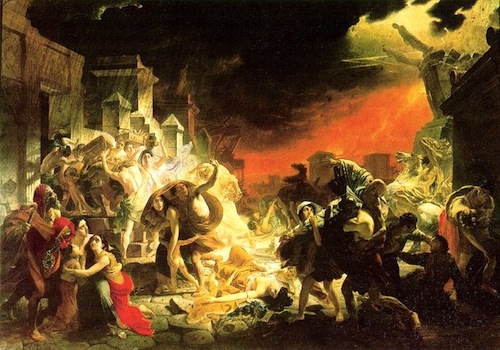
A panic-stricken crowd followed us, and (as to a mind distracted with terror every suggestion seems more prudent than its own) pressed on us in dense array to drive us forward as we came out. Being at a convenient distance from the houses, we stood still, in the midst of a most dangerous and dreadful scene. The chariots, which we had ordered to be drawn out, were so agitated backwards and forwards, though upon the most level ground, that we could not keep them steady, even by supporting them with large stones. The sea seemed to roll back upon itself, and to he driven from its banks by the convulsive motion of the earth; it is certain at least the shore was considerably enlarged, and several sea animals were left upon it. On the other side, a black and dreadful cloud, broken with rapid, zigzag flashes, revealed behind it variously shaped masses of flame: these last were like sheet-lightning, but much larger. Upon this our Spanish friend, whom I mentioned above, addressing himself to my mother and me with great energy and urgency: ” If your brother,” he said, “if your uncle be safe, he certainly wishes you may be so too; but if he perished, it was his desire, no doubt, that you might both survive him: why therefore do you delay your escape a moment?” We could never think of our own safety, we said, while we were uncertain of his. Upon this our friend left us, and withdrew from the danger with the utmost precipitation.
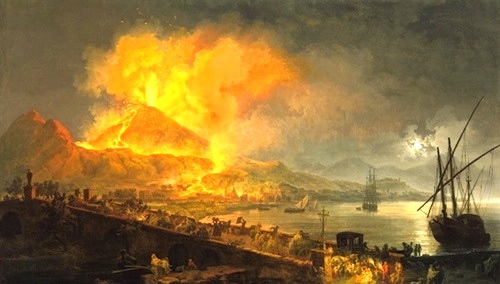
Soon afterwards, the cloud began to descend, and cover the sea. It had already surrounded and concealed the island of Capreae (Capri) and the promontory of Misenum. My mother now besought, urged, even commanded me to make my escape at any rate, which, as I was young, I might easily do; as for herself, she said, her age and corpulency rendered all attempts of that sort impossible; however, she would willingly meet death if she could have the satisfaction of seeing that she was not the occasion of mine. But I absolutely refused to leave her, and, taking her by the hand, compelled her to go with me. She complied with great reluctance, and not without many reproaches to herself for retarding my flight. The ashes now began to fall upon us, though in no great quantity. I looked back; a dense dark mist seemed to be following us, spreading itself over the country like a cloud. ‘Let us turn out of the high-road,’ I said, “while we can still see, for fear that, should we fall in the road, we should be pressed to death in the dark, by the crowds that are following us.” We had scarcely sat down when night came upon us, not such as we have when the sky is cloudy, or when there is no moon, but that of a room when it is shut up, and all the lights put out. You might hear the shrieks of women, the screams of children, and the shouts of men; some calling for their children, others for their parents, others for their husbands, and seeking to recognize each other by the voices that replied; one lamenting his own fate, another that of his family; some wishing to die, from the very fear of dying; some lifting their hands to the gods; but the greater part convinced that there were now no gods at all, and that the final endless night of which we have heard had come upon the world. Among these there were some who augmented the real terrors by others imaginary or willfully invented.
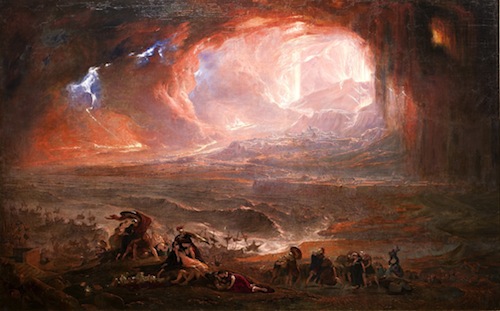
I remember some who declared that one part of Misenum had fallen, that another was on fire; it was false, but they found people to believe them. It now grew rather lighter, which we imagined to be rather the forerunner of an approaching burst of flames (as in truth it was) than the return of day: however, the fire fell at a distance from us: then again we were immersed in thick darkness, and a heavy shower of ashes rained upon us, which we were obliged every now and then to stand up to shake off, otherwise we should have been crushed and buried in the heap. I might boast that, during all this scene of horror, not a sigh, or expression of fear, escaped me, had not my support been grounded in that miserable, though mighty, consolation, that all mankind were involved in the same calamity, and that I was perishing with the world itself. At last this dreadful darkness was dissipated by degrees, like a cloud or smoke; the real day returned, and even the sun shone out, though with a lurid light, like when an eclipse is coming on. Every object that presented itself to our eyes (which were extremely weakened) seemed changed, being covered deep with ashes as if with snow. We returned to Misenum, where we refreshed ourselves as well as we could, and passed an anxious night between hope and fear; though, indeed, with a much larger share of the latter: for the earthquake still continued, while many frenzied persons ran up and down heightening their own and their friends’ calamities by terrible predictions. However, my mother and I, notwithstanding the danger we had passed, and that which still threatened us, had no thoughts of leaving the place, till we could receive some news of my uncle.
And now, you will read this narrative without any view of inserting it in your history, of which it is not in the least worthy; and indeed you must put it down to your own request if it should appear not worth even the trouble of a letter. Farewell.” Pliny the Younger—Article by Sandra Sweeny Silver
